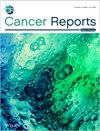An Advanced IVB Lung Adenocarcinoma Patient With KRAS Mutations, Benefited From Camrelizumab Combined With Anti-Angiogenic Agents for Therapy: A Case Report
Abstract
Background
Although the presence of Kirsten murine sarcoma virus (KRAS) mutations predicts a failure of non-small cell carcinoma (NSCLC) patients to benefit from epidermal growth factor receptor (EGFR)—tyrosine kinase inhibitor (TKI) therapy it may be more sensitive to programmed combination therapy of programmed death 1 (PD-1)/programmed death ligand 1 (PD-L1) inhibitors + anti-angiogenesis. Recent treatment guidelines and clinical studies related to adenocarcinoma in NSCLC have indicated that in patients with inoperable stage IV lung adenocarcinoma, immune checkpoint inhibitors in combination with anti-angiogenic drugs may exert a synergistic effect and significantly improve the efficacy of near-term treatment, but quantification and long-term follow-up of specific clinical indicators are still lacking. No previous cases of long-term good results with camrelizumab combined with anti-angiogenic agents for KRAS-mutated NSCLC have been described.
Case
This manuscript reports a case of a patient with advanced NSCLC with pleural effusion and KRAS mutations treated poorly with conventional chemotherapy who had long-term (more than 18 months) benefit with immunotherapy combined with an anti-angiogenic inhibitor in Shanghai General Hospital. In this case, pharmaceutical care of the patient was carried out through therapeutic drug adjustment, compliance, efficacy assessment, and safety evaluation to provide a reference for improving the efficacy and safety of drug therapy in clinical practice. As of the last follow-up date (December 2023), overall survival was 27 months, and the patient is currently in good general condition with no significant complaints of discomfort.
Conclusion
ICLs in combination with antiangiogenic therapy may be a therapeutic option for patients with KRAS mutations in advanced non-small cell lung cancer with good persistence.


 求助内容:
求助内容: 应助结果提醒方式:
应助结果提醒方式:


